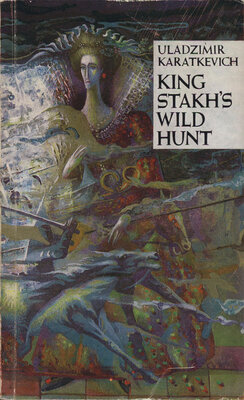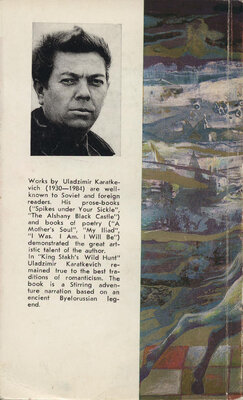King Stakh's Wild Hunt
Уладзімір Караткевіч
Выдавец: Мастацкая літаратура
Памер: 248с.
Мінск 1989
neously a significant stun of money was found missing from the treasury of the Amateur Society. A search was begun for Berman, but he had disappeared together with his mother and younger brother, who was being brought up at some private boarding-school and had arrived in the city only the previous year. His brother, in addition, was noted for being unsociable, in spite of the fact that he had lived at a boardingschool.
When their absence was noticed, it turned out that they had sold their house and had disappeared. The authorities became interested in them. And it became clear that these Bermans were in general not Bermans, but who they were — nobody knew.
“Well, yes... A little we have learned,” I said. “There is one interesting thing here: Berman is a criminal. But he fooled a man who like himself was a thief, and it is not for me to judge him. He will receive his just deserts, but that will be later. What’s curious here is something else. Firstly, where are his mother and brother? Secondly, who is he in reality? It’s clear why he appeared here. He had to hide. But who he is, who his relatives are — that has yet to be cleared up. I shall without fail take up this question. But, Svetilovich, I have almost no news, except what I learned, and that from the mouth of a mad woman, that on that fatal night Roman was lured from his house by Garaboorda. But I don’t even remember what his mug is like, even though I must have seen him at Yanowskaya’s party.”
“That doesn’t matter, we’ll find out.”
We came up to the grove and went deep into it. It was the only grove in the district in which leaf-bearing trees predominated. And there in a
glade, not a very large one, we saw Rygor leaning against an enormous upturned root, holding a long hand-gun on his knees. Seeing us, he got up, looked sideways at us as a bear does and changed the position of the rifle-stock to hold it more conveniently.
“Be on your guard when walking in the swamp, be on your guard in the park and especially its southern and western, outskirts,” he muttered instead of a greeting.
“Why?” I asked, having introduced him to Svetilovich.
“This is why,” he growled. “They are not phantoms. Too well do they know the secret paths across the Giant’s Gap. It surprises you that they can race where no roads are, but they know only too well all the secret hide-outs in the region and all the paths leading to them; they use very ancient horseshoes which are nailed onto the horses’ hoofs with new calks. What’s true is true. The horses step as bears do — at first with their left and then with their right feet, and their steps are wavy, much wider than those our horses make. And for phantoms they are too feeble. A phantom can pass through anything, while these only through the brokendown fence at the Gap... And I have learned something else too: there were no more than ten of them the last time, because only half of the horses rode as a horse rides with a person on his back. On the rest there was something lighter on their backs. The one rushing at their head is very hot-tempered: he tears at the lips with the bits. And what is more — one of them takes snuff. I found the dust of green tobacco at the place where they had stopped off before making their last race and had left many footprints, having trampled the ground there. It is
the place where the large oak stands not far from the broken-down fence.”
“Where can their meeting-place be?” I asked.
“I know where to look,” Rygor answered calmly. “It is somewhere in the Yanowsky Reserve. I determined that from the footprints. Look here.”— With a vine twig he began to draw on the earth. “Here is the virgin forest. At the time when Roman was killed, the footprints disappeared right here, almost at the bog surrounding the Reserve. When they were pursuing you after the evening at Dubatowk’s, the footprints disappeared northwards, and after what took place near the Yanowsky castle, when they shouted,— slightly farther northward. You see, the paths almost coincide.”
“Really, that’s so,” I agreed. “And if they are prolonged they will come together at one point, somewhere in the bog.”
“I’ve been there,” Rygor slightly snorted, as if about some most usual thing. “The swamp there in that place is considered fatal, but I’ve seen bristle-grass growing there in some places. And wherever this grass grows, the horse belonging to a lousy fellow, can always put his foot, if that is what his lousy owner needs.”
“Where is this place?” Svetilovich asked, growing pale suddenly.
“At the Cold Hollow where the stone called the Witch’s Mortar lies.”
Svetilovich grew even paler. Something had alarmed him, but he took himself in hand.
“And what else?” I asked.
“This is what else.” Rygor gloomily muttered, “that you are on a false scent. Although it was Garaboorda who lured Roman out of his house, he has no connection with the Wild Hunt. Those two nights when it appeared
the last time, Garaboorda was sitting in his lair as a rat in its hole. I know that because his place was well watched.”
"But he is interested in Yanowskaya’s dying or going mad. That would benefit him. It was he who persuaded Kulsha to invite Yanowskaya to his house that evening, it was he who sent his own daughter to the Kulsha’s too, and then detained everybody there till night-time.”
Rygor became thoughtful. Then he muttered:
“Perhaps you are right. You are clever, and you must know. But Garaboorda was not there, I stake my head on that. He rides a horse badly. He’s a coward. And he keeps to his castle all the time. But he can talk others into doing dirty tricks.”
And here Svetilovich became even paler, staring into space, as if he were considering something extremely important. I did not disturb him. If he wanted to, he’d tell us himself. However, he didn’t think long.
“Brothers, it seems I know this person. You understand, you have helped me to find an answer to a riddle. Firstly: at the ‘Witch’s Mortar’. Yesterday evening I saw a man there whom I know very well. I’d never have suspected him, and that disturbs me. He was very tired, dirty, riding on horseback to the Gap. Seeing me, he came nearer: ‘What are you doing here, Mr. Svetilovich?’ 1 answered jokingly, ‘I’m in search of yesterday’s day.’ And he burst into laughter and asked: ‘Does yesterday’s day, then, the devil take it, come into today’s?’ And I said to him: ‘Yesterday’s day hangs round all our necks.’ Then he said: ‘However, it doesn’t come, does it?’ Then I said: ‘But the Wild Hunt? Hasn’t it come from the past?’ His countenance even changed. ‘To the devil with it! Don’t even men
tion it.’ And he moved on northwards along the quagmire. I went on towards your house, Mr. Belaretzky, but when I turned round I saw that he had turned back and was letting himself down into the ravine. He went there and disappeared.”
“Who was it?” I asked. Svetilovich hesitated. Then he raised his bright eyes.
“Forgive me, Belaretzky, forgive me, Rygor, I cannot tell you yet. It’s too important, and I’m not a gossip. I cannot lay such a terrible accusation on the shoulders of a person who, perhaps, is not guilty. You know that for such a thing a person may be killed simply on suspicion. All that I can say is that he was among the guests at Yanowskaya’s. I’ll think it over in the evening, will weigh everything, will recall in detail the story about the promissory notes and tomorrow I’ll tell you. But for the present I cannot say anything more...”
Oh, of course! A dependable alibi. Oh, fools! And what dim thoughts! By analogy I recalled my own indefinite thoughts, too, the thoughts about “the hands”, which were to help me in investigating something important.
We decided Rygor would sit this night at the Cold Hollow. It was not far from there to Svetilovich’s house where he lived with an old attendant and a cook. In case of need we could find him.
“Nevertheless I don’t believe that I’ll be able to catch them when they leave. Svetilovich has put them on their guard,” Rygor said hoarsely. ‘They’ll find another road out of the dense forest onto the plain.”
“But another road into the park they won’t find. 1’11 be lying in wait for them near the broken-down fence,” I decided.
“It’s dangerous alone,” Rygor lowered his eyes.
“But you, too, will be alone.”
“Me? No! I’m nobody’s fool. I’m bold, but not so bold as to fight one against twenty.”
“But I tell you,” I said stubbornly, “that the mistress of Marsh Firs will not live through another appearance of the Wild Hunt at the walls of her house. I must not allow them to enter the park if they intend to come.”
“Today I cannot help you,” said Svetilovich sunk in a brown study. “What I must clear up is more important. Perhaps the Wild Hunt won’t come today at all. An obstacle will stand in its way.”
“Well then,” I, rather dryly, interrupted him. “You should have expressed your views and not given us puzzles to answer. I’ll go out alone today. They aren’t expecting anybody, and on that I am laying my hopes. By the way, they don’t know that I have a gun. Twice I met with the Hunt, and also with that man who shot me in the back, and I never used it. Well then, they will see yet... How slowly we are untying this knot! How lazily our brains are working!”
“Everything is cleared up easily and logically only in bad novels,” Svetilovich growled, offended. “In addition, we are not detectives from the provincial police. And thank the Lord for that!”
Frowning, Rygor was digging the earth with a twig. “Enough!” he said with a sigh. “We must act. I’ll make them hop about yet, the skunks! And, excuse me, after all you are aristocrats, gentlemen all. We are together now, following the same path, but if we find them, we muzhiks shall not only kill these savage creatures, we will burn their nests, we will bring
utter ruin on their offspring, and we’ll perhaps put an end to their descendants.”
Svetilovich began to laugh:
“Belaretzky and I are very fi-ine gentlemen! As the saying has it: a gentleman all dressed up in a caftan made of grape vine, and sandals made of bast. Actually, we ought to annihilate them all and their like including their young ones, for with the passing of time, these young ones will grow up to be aristocrats.”
 КНІГІ ОНЛАЙН
КНІГІ ОНЛАЙН


